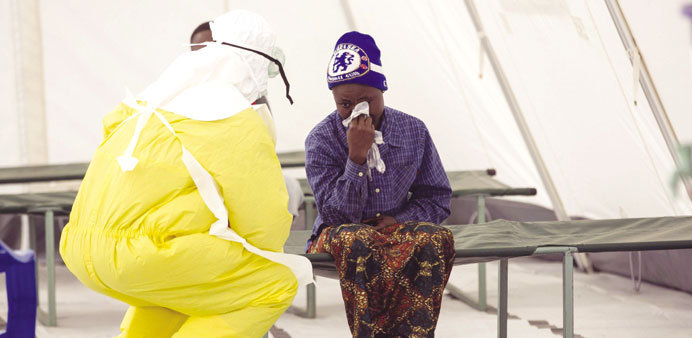A health worker wearing protective gear tends to a newly-admitted suspected Ebola patient in a quarantine zone at a Red Cross facility in the town of Koidu, Kono district in Eastern Sierra Leone in this December 19, 2014 file photo. Global charity Oxfam has called for a post-Ebola “Marshall Plan” to support basic services like health and sanitation, and provide jobs and cash for families hit by the crisis.
Reuters/Dakar, Monrovia, Conkary
In the marble atrium of the Mammy Yoko hotel in Freetown, manager Nuno Neves has spotted something he has not seen since the Ebola virus struck Sierra Leone nine months ago: foreign businessmen.
The Radisson Blu chain opened the four-star hotel in April to cater for investors in one of Africa’s fastest-growing economies. A month later, Ebola crossed the border from Guinea and those investors fled.
For months, Sierra Leone was cut off from the world amid panic at the worst recorded outbreak of the hemaorrhagic fever, which has killed more than 9,500 people in Sierra Leone, Guinea and Liberia and infected over 23,500.
Nine of the 11 airlines serving Freetown, including British Airways, suspended flights. Miners pulled out foreign staff, and banks declined credit for local companies.
To stave off closure, Neves cut working hours and salaries. What saved the 170-room hotel was an influx of foreign aid workers in October.
But with infection rates slowly declining, investors have begun to talk about post-Ebola reconstruction. Neves has noted the return of businessmen not seen since the hotel opened.
“They don’t bring their teams. They just come to see what is going on and then they leave,” he said, adding that ‘business as usual’ remains far off. “This will be a year focused on Ebola. First the fight to end Ebola and then reconstruction.”
For Sierra Leone, Guinea and Liberia, the timing is terrible. As they struggle with Ebola, they have been hit by a commodities slump: the price of iron ore, the largest export from Liberia and Sierra Leone, roughly halved last year.
Between Ebola and the commodities rout, the World Bank estimates the three countries will lose at least $1.6bn in output this year, or over a tenth of their combined GDPs.
Sierra Leone, the worst affected by Ebola, has also been hardest hit economically. From 11% growth in 2013, its $5bn economy is forecast to contract 2.5% this year.
Its two largest employers, Africa Minerals and London Minerals, have halted iron ore production following the price slump. With more than half Sierra Leone’s 6mn people living in poverty, Ebola has destroyed a further 180,000 jobs as it ravaged agriculture and services, the World Bank said.
Clive Dawson, head of the British Chamber of Commerce in Sierra Leone, is working with companies to identify investment opportunities in agriculture, health and construction that could create urgently needed jobs.
“The world climate has changed completely,” he said. “But for the ones who are brave, the opportunities are enormous because the government is bending over backwards to help investors.”
Not all mining investors have been deterred by the price fall. London-listed Sable Mining signed a deal last month to send iron ore from a planned mine in Guinea by rail to Liberia’s port of Buchanan.
Decision on Ebola mass vaccination in August at the earliest, says WHO
An independent advisory body will decide in August at the earliest on whether to recommend widespread introduction of an Ebola vaccine, depending on results of clinical trials and the epidemic’s course, the World Health Organisation said yesterday. All three worst-hit countries in West Africa - Guinea, Liberia and Sierra Leone - aim to conduct phase III final-stage clinical trials of experimental vaccines. Liberia is already testing both the GlaxoSmithKline and Merck-NewLink vaccines, while Sierra Leone and Guinea are due to announce plans soon. WHO spokesman Christian Lindmeier, reporting on a three-day meeting of experts, told a news briefing in Geneva: “Vaccine introduction is by no means a given and will depend on the results of clinical trials and recommendations from WHO’s Strategy Advisory Group of Experts (SAGE) on vaccines and immunisation. “The earliest that the SAGE is expected to make recommendation on a wide-scale introduction is August.

